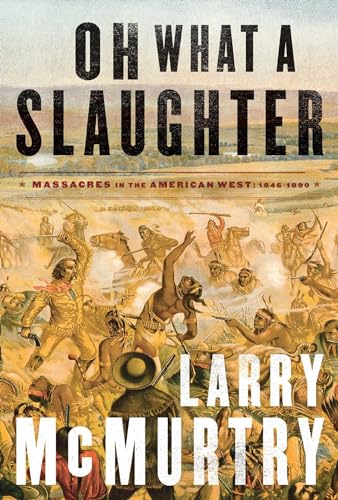Oh What a Slaughter
Massacres in the American West 1846--1890
Larry McMurtry
BOOK REVIEW

In a stark and unflinching examination of a turbulent period in American history, Oh What a Slaughter: Massacres in the American West: 1846-1890 by Larry McMurtry transports readers into the chilling narratives of violence, desperation, and the relentless march of expansionism. This book is not just a collection of historical accounts; it is a painful reflection of a nation grappling with its identity amidst bloodshed.
McMurtry, a literary titan known for his rich storytelling and deep character exploration, steps away from his more famous fiction to present a work steeped in raw reality. With sharp prose, he delves into the harrowing tales of massacres that permeated the American West during a period often romanticized in popular culture. His focus on the highs and lows of human experience-those moments of profound cruelty and unthinkable loss-forces readers to confront the ugliness that often lurks beneath the surface of progress.
As you turn the pages, you encounter not merely a retelling of historical events, but rather an emotional saga that envelops you whole. These brutal accounts of the conflicts between settlers and Indigenous peoples-a clash of cultures marked by atrocity-shock the conscience. McMurtry's narrative style compels you to feel anger, sorrow, and, at times, a suffocating sense of inevitability.
Throughout the book, you will find that the author is not just chronicling events; he is framing a critical discourse on colonialism, manifest destiny, and the cost of expansion. This is a journey into the darkness that shaped a nation. McMurtry's compelling arguments echo through time, reverberating with contemporary issues of justice, recognition, and reconciliation that still plague us today.
Critics have noted the emotional depth of McMurtry's work, praising his ability to weave personal stories with broader historical contexts. While some readers appreciate the emotional gravity he brings to such a weighty subject, others have critiqued the book for its focus on the darker aspects of history, arguing that it can be overwhelming. Yet, would it be fair to simply overlook the legacy of these narratives by choosing not to embrace the discomfort they cause? After all, as McMurtry illustrates, ignoring these tragedies does not erase them-it merely buries them deeper.
The author crystallizes important figures and events that shaped this era, inviting readers to forge connections to those long-forgotten souls. Interspersed within the historical details are reflections on humanity and the rationalizations used in the wake of violence-making you question not only the past but also the present. You are prompted to scrutinize the morality of historical narratives and the way they shape our understanding of justice and accountability.
While McMurtry's work is an academic undertaking, this is no dry textbook. He infuses his prose with a sense of urgency and poignancy that resonates deeply. As readers, you cannot help but empathize with the victims and feel the weight of history crashing down like a tantamount force. It's precisely this emotional engagement that readers will find both compelling and distressing; it pulls you into the heart of a maelstrom of anguish and reflection.
As the dust settles on the pages, McMurtry's goal becomes clear: to invoke within you a sense of responsibility-to acknowledge the past that informs our present. His examination is not merely an intellectual exercise but a clarion call to confront uncomfortable truths about the darker sides of humanity.
The emotional impact of Oh What a Slaughter lingers long after the last page. It serves not just as a history lesson but as a poignant reminder of the cost of human ambition. In our quest for progress, we often overlook the devastation left in the wake of our desires. McMurtry's narrative is an invitation to remember, to honor, and to reckon with a complex legacy that is as relevant today as it was in the 19th century.
In a world rife with conflict and division, Oh What a Slaughter urges you to reflect, to empathize, and ultimately, to choose awareness over ignorance. It challenges you to confront past atrocities and adopt a broader perspective. The riveting accounts of tragedy force an examination of cultural narratives and prompt necessary discussions about forgiveness, healing, and understanding. Don't miss out on the opportunity to dive into this powerful exploration of America's dark past and its lingering effects. The journey through McMurtry's words will surely transform your perspective, creating a new sense of urgency to engage with history and its ongoing ramifications.
📖 Oh What a Slaughter: Massacres in the American West: 1846--1890
✍ by Larry McMurtry
🧾 192 pages
2013
#what #slaughter #massacres #american #west #1846 #1890 #larry #mcmurtry #LarryMcMurtry